The 10 Best Episodes Of 'The Flash'
"My name is Barry Allen, and I am the Fastest Man Alive."
After a sincere pilot with occasional Sherlock-esque graphics that were swiftly abandoned, The Flash quickly morphed from a potential procedural into a superhero soap opera. And The CW's second "Arrowverse" show was off to the races.
Central City forensics expert Barry Allen (Grant Gustin, Glee) first showed up on Arrow, and after spending several months in a lightning-induced coma, he awoke to super-speed and world of meta-humans using their powers for evil. The heart and soul of a show where every second character could be described as such, Gustin's at times pissy, always well-meaning Barry is a wonderful addition to the modern superhero pantheon. Despite its ups and downs, The Flash manages to be one hell of a neat show about a found family trying to be better — towards each other, and themselves.
After seeing his mother killed as a child by a super powered "Speedster," after his father Henry Allen (John Wesley Shipp, who played Barry on the 1990 The Flash TV Show) was put away for her murder. Barry was sent to live with Henry's friend Detective Joe West (Jesse L. Martin), a surrogate father as warm and kind as his own biological one, and Joe's daughter Iris, the future journalist, #TeamFlash leader and Mrs. Barry Allen. In the present, The Flash fights alongside a wonderful crew of scientists, including Danielle Panabaker's Caitlyn Snow (who doubles as the anti-hero Killer Frost), pop-culture-reference-machine Cisco Ramon (the multiverse-travelling Vibe), played by the goofy, charming Carlos Valdes, and Tom Cavanagh as a different version of Professor Harrison Wells each season. What are the logistics there? Well, The Flash is very quick to introduce time travel, and by its second season, it dives full-on into alternate universes a la DC Comics, allowing Cavanagh to embody everything from evil Wells, to stoic Wells, to dumb Wells, to Mad Max: Fury Wells, to, err... Matthew McConaughey Wells.
With fun villains and guest stars galore (including Mark Hamil, reprising his 1990 Flash role The Trickster, as well as WWE Superstars Edge and Godlberg), the show has — despite its occasional wheel-spinning and character un-development — proven to be a bright, fun, sci-fi laden romp that isn't afraid to get weird; you ever see a villain grab a bolt of lightning with his bare hands and throw it back at the hero? The Flash did that three seasons ago. Its fifth begins October 9th, so we figured now might be a good time to catch up on some of the show's best episodes, currently streaming on Netflix. Enjoy!
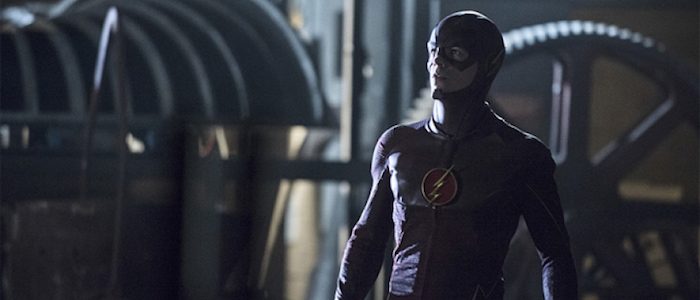
1. S01E06 "The Flash is Born"
Right off the bat, being a fan of The Flash means being privy to (and accepting of) jokes about repetitiveness. While that hardly sounds like a ringing endorsement, the first season's formula of "Barry must defeat this week's one-note villain by running even faster than before!" is contextualized rather sweetly in "The Flash is Born," a story of Barry Allen's high-school bully being granted superpowers and using them to... do more bullying. Barry, a character who's used to running away from his problems, is forced to charge headfirst towards his past — the bully Tony Woodward, now the iron-skinned Girder, kidnaps Iris and takes her to their old high-school — and Barry punches his past in the face.
By this point in the season, the mysterious identity of Harrison Wells is already beginning to unravel (the speed at which The Flash's first season moves is commendable) though the little hints we get come not from Barry's investigations, but rather, the doubts of the side characters in his vicinity, namely Detective Joe West. Even if the A-plot isn't to someone's liking, any given episode has enough overprotective Joe, quietly charming Caitlyn and loudly charming Cisco to carry the hour all on its own; thankfully, this early episode features bits of every element that make the show work.
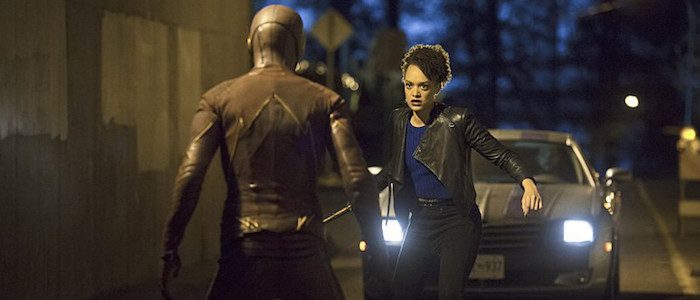
2. S01E12 "Crazy For You"
A lot happens in "Crazy For You." A teleporter breaks her boyfriend out of prison and Barry's incarcerated father helps investigate. The Pied Piper, captured in the previous episode, reveals the fates of both Caitlyn's fiancé Ronnie Raymond (Robbie Amell) and Professor Martin Stein (Victor Garber), both thought to be dead: on the day of the particle accelerator explosion that gave Barry his powers, Ronnie and Martin merged to form a single nuclear-powered superhero entity, F.I.R.E.S.T.O.R.M. Oh, and a giant sentient Gorilla attacks unsuspecting city workers. Despite all the mayhem however, the episode's best moment (a season highlight, really) comes in the form of a simple conversation between father and son.
DC TVs' affinity for casting familiar faces pays off big time in The Flash, with 1990's Barry (John Wesley Shipp) passing the baton to his successor Grant Gustin, but the duo's dramatic prowess and their actual father-son dynamic cannot be underestimated. Despite Barry's secret-keeping, Henry Allen seems to know his son's superhero identity. When Henry lands himself in the hospital wing of Iron Heights prison after helping with Barry's investigation, Barry pays him a visit; Henry plays coy about The Flash's superhero antics. "If The Flash were my son," he begins, before launching into a tear-jerking proud father speech that cuts right to the heart of what makes the show so wonderful: it isn't afraid to let its characters, especially its men, be emotionally vulnerable.
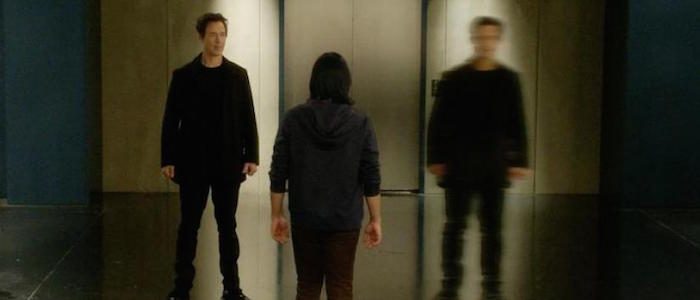
3. S01E15 "Out of Time"
The pace at which The Flash unfolds becomes clear in its fifteenth episode. Its Wells-centric secrets, which one would've thought would only arrive at the end of the season, are revealed about half way through. Not only that, their implications span centuries. A lovable main character is murdered. Barry reveals his secret identity to the woman he loves. A scorned brother of a dead, weather-controlling supervillain returns to exact his vengeance, unleashing a Tsunami upon the city. All this matters dramatically, but in the larger scheme of the plot, each instance is only a temporary displacement. Why? Because as The Flash runs back and forth along the coastline to stop the Tsunami, he accidentally runs back in time to the previous day.
Which brings us to...
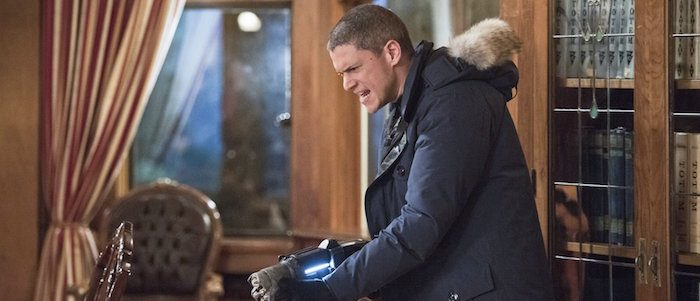
4. S01E16 "Rogue Time"
Alongside its "whodunit" murder mystery (the identity of the man who killed Barry's mom), The Flash also features the mystery of time-travel, the specifics of which are laid out in episode sixteen. By this point, we know the who's who — Eobard Thawne/The Reverse Flash, a distant descendant of Iris' beau Eddie, travelled back in time centuries to kill Barry's mother — though it's here that we learn both the "why" as well how this event is connected to plot of the first season. Thawne, a man trapped in time, was responsible for creating The Flash in the first place and wants to use his speed to return to the future.
As Barry navigates the tightrope that is re-living an entire day, he's caught between using his knowledge of events to change things for the better, and causing ripple-effects in the process, undoubtedly making things worse. Time in The Flash is a force that, if meddled with, could have potentially dire consequences. Then again, the consequences in this case are pretty damn delightful: as Barry prevents the plot of the previous episode from repeating itself, he unleashes the deliciously enjoyable Captain Cold/Leonard Snart (Wentworth Miller) and Heatwave/Mick Rory (Dominic Purcell) on the city, a pair of pun-making bank robbers who embody "cool" and "hot-headed" respectively. If the heroes' friendships are a joy to watch, the villains' are even more so.
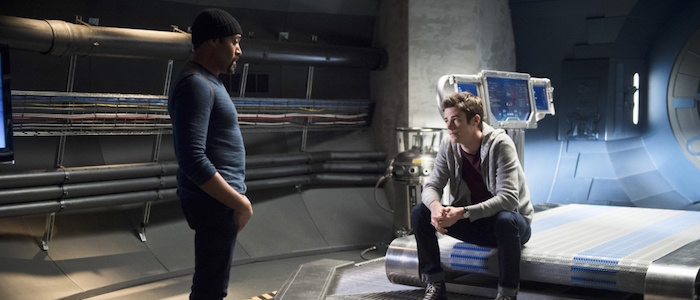
5. S01E23 "Fast Enough"
The first season finale of The Flash hits a multitude of high-points, bringing a number of stories to a head in emotionally surprising ways. The long-awaited wedding of Caitlyn and Ronnie is interrupted by potential tragedy. Eddie Thawne, a character made painfully aware of his unremarkable future, is given the power to change it (interestingly the meta-text of Eddie not existing in the comics, implied to be the "original" timeline from which the Reverse Flash hails, become its own opportunity for him to establish his heroism). Barry finally goes back in time to save his mother, though another future version of Barry prevents him from doing so — an upsetting yet necessary character moment in which Barry is forced to learn he can't change the past, as well as one that allows him to finally say goodbye. And lest we forget, a giant wormhole above the city is about to swallow all of human existence unless Barry, F.I.R.E.S.T.O.R.M., Eddie and all of Team Flash complete their respective character arcs at exactly the right moments.
It's wonderful storytelling through and through, and it sets up the events of future seasons and even spin-off shows through audacious comicbook easter eggs (time-traveller Rip Hunter is mentioned by name; original Flash Jay Garrick may as well be). Unfortunately, it may be the only time the show has truly nailed a season finale, but as high bars go, one can hardly complain about the benchmark the show sets this early on.
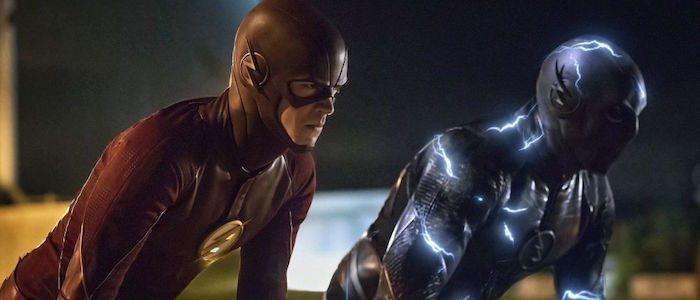
6. S02E18 "Versus Zoom"
While undoubtedly weaker than its predecessor, The Flash's second season presents an array of interesting new concepts, adding alternate universes on top of an already chaotic time-travel narrative. Over on Earth-2, we see the origins of the demonic Zoom, presented as a dark mirror to Barry much in the same way as Voldemort is to Harry Potter. Childhood tragedy befell Zoom much as it did The Flash, but the love afforded to Barry (the kind that was never given to Zoom, and thus, the kind he would never give) made the Scarlett Speedster wildly different from his villainous counterpart.
In the present, the differences between the two are readily apparent. Zoom, the long-time rival of his Earth's Flash, craves speed, power and adoration, while these are things Earth 1's Flash Barry Allen just happens to have. What's more, Zoom actually manages to acquire (see also: steal) all the things he desires, kidnapping Caitlyn and siphoning off Barry's speed, rendering him merely human in the face of his greatest threat.
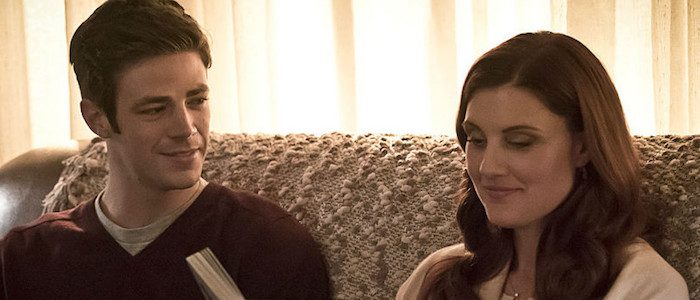
7. S02E21 "The Runaway Dinosaur"
Say what you will about Kevin Smith's recent cinematic output, he's directed the best episode of The Flash till date, if not the best episode of any live-action DC TV show. Diving deep into comic mythos, Smith treats the "speed force," from which Barry draws his power, as a living entity, as well as a realm which Barry can travel to in order to converse with it.
The dead come back in multiple forms in "The Runaway Dinosaur." On our regular Earth, the re-animated corpse of Girder/Tony Woodward torments Team Flash (zombie episode, hell yeah!) while within the ethereal realm Barry finds himself trapped in, the speed force takes the form of his mother, allowing him the opportunity to come to terms with her death in order to regain his powers. The title refers to a story Barry's mother used to read to him as a child; in doing so once more, the speed force allows Barry to return to a state of childlike simplicity in order to accept the moment of his mother's death, which he's been trapped by for years. Not only that, the unfolding of such an enormous character moment in the simplest of ways — one even a child could understand — re-establishes the child-like nature of the show, in which awe and wonder are tethered to desires to feel the comforts of childhood innocence.
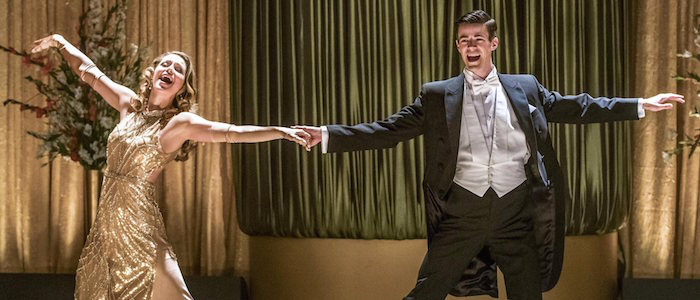
8. S03E17 "Duet"
One of the most delightful things about Barry Allen is his friendship with Kara Zor-El, Superman's cousin, who exists in an entirely different universe. The two first met during a crossover episode of Supergirl (which we'll be covering soon; stay tuned!) and have since become bright, sunny superhero BFFs. They even sing about their friendship in a song called "Super Friend!" How lovely.
In yet another episode that sees our heroes trapped in a different realm, the extra-dimensional being The Music Meister, who seems aware of the fiction of The Flash's and Supergirl's universes, places them in an alternate dimension where characters from all four DC shows (The Flash, Supergirl, Arrow and Legends of Tomorrow) play various Broadway archetypes in a 1920s setting. Their goal, if they wish to return to their own world, is simply following the Meister's musical script. Like the first crossover, this episode essentially exists because fans willed it so. Given that both The Flash and Supergirl are played by Glee alums and most of the remaining cast come from musical theatre, it only made sense for something this whacky and delightful to take place on screen. What's more, the episode ends with Barry proposing to Iris in the form of a self-written song, "Running Home to You" (written by Benji Pasek and Justin Paul, La La Land's "City of Stars") which is an absolute joy.
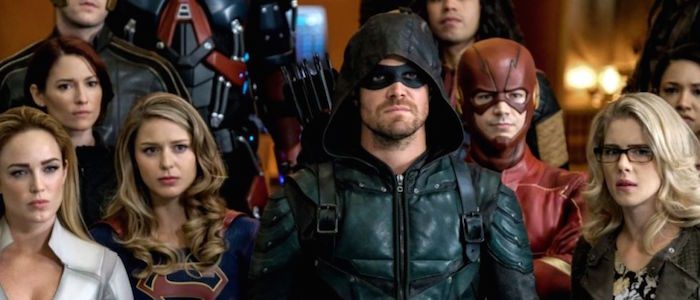
9. S04E08 "Crisis on Earth-X"
This one's a bit of a cheat, since I'm really going to be talking about four episodes, one from each DC series, in another unprecedented crossover. It essentially functions as a two-and-a-half-hour feature film that incorporates concepts and character arcs from each series, representing the very best of them — both as a well-oiled shared universe machine, as well as individual, dramatically potent units. Long story short: all these beloved characters, from across space, time and different dimensions, gather for Barry and Iris' wedding. Super-Nazis from an alternate universe where Germany won World War II invade. As expected, all Hell breaks loose.
While a lot of properties would play coy with their commentary, "Crisis on Earth-X" doesn't bother wasting time with Nazi-inspired entities doing vaguely or nebulously mean things un-tethered from real-world ideology. No, these Nazis are as real as they come — apart from being mirror-versions of our superheroes, that is. The Nazi Supergirl from Earth-X wears the S.S. logo on her chest., for instance. They may be aliens and speedsters and billionaire archers, but these are real modern day Nazis, descended from Hitler's Reich, and they're locking up Jewish, queer and non-white superheroes in concentration campts. The episode also functions as a backdoor pilot for Freedom Fighters: The Ray, introducing DC's first gay title character on television (Russell Tovey plays The Ray; he also voices the character on the aforementioned web series). The Ray also happens to be involved with an alternate universe version of Leonard Snart, allowing a returning Wentworth Miller to play an even sassier version of Captain Cold whilst also allowing Miller, a bisexual actor, to embody one of his real-world struggles. Watching heroes fight alternate versions of themselves is undoubtedly fun, but to have it actually mean something is an indication that DC TV truly understand what superheroes are about.
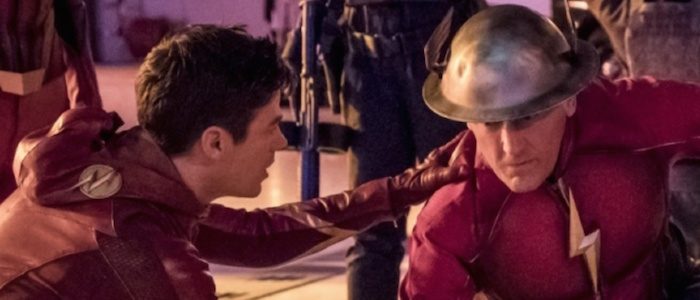
10. S04E15 "Enter Flashtime"
"Enter Flashtime" is the kind of story that could only ever unfold on The Flash: it's an hour of television that takes place almost entirely within the fraction of a second after a nuclear bomb has been detonated.
The Flash brings both speedster heroes from alternate Earths (Earth-2's Jesse Quick and Earth-3's Jay Garrick) as well as other non-speedster heroes into "Flashtime," the accelerated state in which everything around them slows down to near-zero — essentially, events as they unfold from a Flash's perspective. In this super-slow-motion realm, the heroes must figure out ways in which to stop this nuclear device from wiping out the city. Should they freeze it? Blow it up? Send it to an alternate dimension? The tension racks up as they debate their next move while incorporating a mix of real-world physics and comicbook pseudo-sciences, as the show gets right in between the very mechanics of how superhero speedsters function in both action and thought. It's an absurd nail-biter in which everyone's safety is hanging by the thinnest possible thread... Oh, and it features an appearance from another mysterious speedster from the future, who just so happens to know all there is to know about The Flash. Who is she? How is she connected to Barry and Iris? Well, we're going to have to watch season 5 to find out.
The Flash returns on October 9th.
